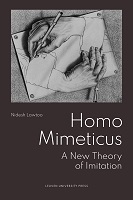Homo Mimeticus
A New Theory of Imitation
| dc.contributor.author | Lawtoo, Nidesh | |
| dc.date.accessioned | 2022-11-08T12:56:46Z | |
| dc.date.available | 2022-11-08T12:56:46Z | |
| dc.date.issued | 2022 | |
| dc.identifier | OCN: 1350570760 | |
| dc.identifier.uri | https://library.oapen.org/handle/20.500.12657/59184 | |
| dc.description.abstract | Genealogy of one of the most ancient and influential concepts in western thought: Mimesis Imitation is, perhaps more than ever, constitutive of human originality. Many things have changed since the emergence of an original species called Homo sapiens, but in the digital age humans remain mimetic creatures: from the development of consciousness to education, aesthetics to politics, mirror neurons to brain plasticity, digital simulations to emotional contagion, (new) fascist insurrections to viral contagion, we are unconsciously formed, deformed, and transformed by the all too human tendency to imitate—for both good and ill. Crossing disciplines as diverse as philosophy, aesthetics, and politics, Homo Mimeticus proposes a new theory of one of the most influential concepts in western thought (mimesis) to confront some of the hypermimetic challenges of the present and future. Written in an accessible yet rigorous style, Homo Mimeticus appeals to both a specialized and general readership. It can be used in courses of modern and contemporary philosophy, aesthetics, political theory, literary criticism/theory, media studies, and new mimetic studies. Ebook available in Open Access. This publication is GPRC-labeled (Guaranteed Peer-Reviewed Content). | en_US |
| dc.language | English | en_US |
| dc.subject.classification | thema EDItEUR::Q Philosophy and Religion::QD Philosophy | en_US |
| dc.subject.classification | thema EDItEUR::Q Philosophy and Religion::QD Philosophy::QDT Topics in philosophy::QDTN Philosophy: aesthetics | en_US |
| dc.subject.classification | thema EDItEUR::Q Philosophy and Religion::QD Philosophy::QDT Topics in philosophy::QDTS Social and political philosophy | en_US |
| dc.subject.classification | thema EDItEUR::J Society and Social Sciences::JB Society and culture: general::JBC Cultural and media studies::JBCT Media studies | en_US |
| dc.subject.other | mimetic studies;Mimesis;intersubjectivity;mimetic theory;contagion;simulation;crowd behaviour;identification | en_US |
| dc.title | Homo Mimeticus | en_US |
| dc.title.alternative | A New Theory of Imitation | en_US |
| dc.type | book | |
| oapen.identifier.doi | 10.11116/9789461664778 | en_US |
| oapen.relation.isPublishedBy | 91436d3b-fb9a-45e9-8a57-08708b92dcda | en_US |
| oapen.relation.isFundedBy | 178e65b9-dd53-4922-b85c-0aaa74fce079 | en_US |
| oapen.relation.isFundedBy | 608fbdcb-bd0a-4d50-9a26-902224692f76 | en_US |
| oapen.relation.isbn | 9789461664785 | en_US |
| oapen.relation.isbn | 9789462703469 | en_US |
| oapen.collection | European Research Council (ERC) | * |
| oapen.collection | EU collection | * |
| oapen.pages | 358 | en_US |
| oapen.place.publication | Leuven | en_US |
| oapen.grant.number | 716181 | |
| oapen.grant.project | HOM | |
| oapen.remark.public | Funder name: KU Leuven Fund for Fair Open Access |

